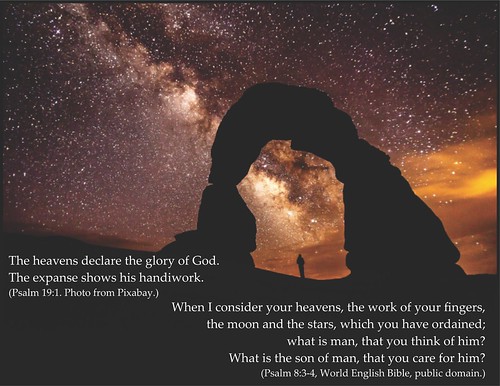National Public Radio, and other news sources, have reported on a
study which indicates that most North Americans (and others) cannot see the
Milky Way, the galaxy that we are part of, because there is too much artificial light (light pollution) in the sky. That’s too bad, for two reasons, at least.
One reason that it’s too bad is
aesthetic. The Milky Way is beautiful. Although it’s not extremely bright, it covers so much of the sky that, when visible, it’s the most obvious feature of the heavens above us. If we can’t see it, we are deprived of one of the most beautiful and majestic aspects of the creation. For comparison, consider your favorite wild flower, or wild bird, or mountain, and suppose that, for some reason, you were never going to see this flower or bird or mountain again. You would be deprived, of some of the beauty that inspires and comforts you, and that’s too bad.
The second reason is that the observation of nature is
one of the ways that God is revealed to us. (It’s not the only one, or the most important, but it’s
one way.) Because the Bible says so.
Psalm 8 tells us that we should praise God, and also indicates that considering the heavens informs us about our place in the creation:
1 Yahweh, our Lord, how majestic is your name in all the earth!
You have set your glory above the heavens!
3 When I consider your heavens, the work of your fingers,
the moon and the stars, which you have ordained;
4 what is man, that you think of him?
What is the son of man, that you care for him?
5 For you have made him a little lower than the angels,
and crowned him with glory and honor.
6 You make him ruler over the works of your hands.
You have put all things under his feet:
Psalm 97 repeats the first theme:
6 The heavens declare his righteousness.
All the peoples have seen his glory.
Psalm 19 explicitly says that nature reveals God to us:
1 The heavens declare the glory of God.
The expanse shows his handiwork.
2 Day after day they pour out speech,
and night after night they display knowledge.
3 There is no speech nor language,
where their voice is not heard.
4a Their voice has gone out through all the earth,
their words to the end of the world.
Such statements are not confined to the Old Testament. Here’s a part of
Romans 1:
20 For the invisible things of him
since the creation of the world are clearly seen, being perceived
through the things that are made, even his everlasting power and
divinity, that they may be without excuse.
So, if we can’t see the Milky Way, we are a little less able to worship God, to understand His redemptive work, and to know our place in creation.
Am I advocating turning off all streetlights, or prohibiting driving after dark? No. That’s not my call, and I often use lights at night, sometimes in what I hope is God’s work. But I should realize that, by indiscriminate use of light, I am cutting myself, and others, off from part of my understanding of God. The
Passenger Pigeon, once the most common bird in North America, became extinct a little over 100 years ago, due to human activity. We can no longer see huge, majestic flocks of these creatures, and so are also, by that lack, deprived of some once available knowledge of God’s power and majesty. The American Bison, and some rhino species, are not yet extinct, but we are never going to see them in the magnificent numbers that people once did, and the rhinos, at least, may really become extinct. Too bad.
We live in a fallen world, and, environmentally speaking, it seems to become less like God gave it to us by the day. As Paul said, in
Romans 8:
19 For the creation waits with eager expectation for the children of God to be revealed. 20 For the creation was subjected to vanity, not of its own will, but because of him who subjected it, in hope 21 that the creation itself also will be delivered from the bondage of decay into the liberty of the glory of the children of God. 22 For we know that the whole creation groans and travails in pain together until now.
Thanks for reading. Look for the Milky Way!
The photo is from
Pixabay, which allows such use.
 Things I have recently spotted that may
be of interest to someone else:
Things I have recently spotted that may
be of interest to someone else: 




